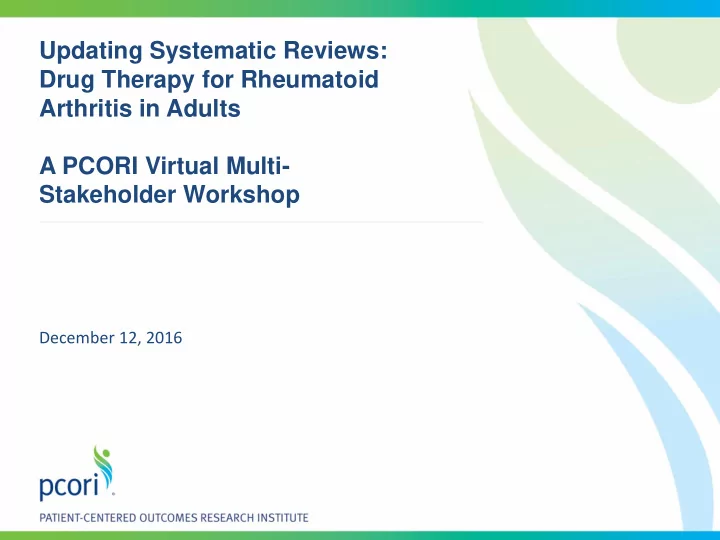

Updating Systematic Reviews: Drug Therapy for Rheumatoid Arthritis in Adults A PCORI Virtual Multi- Stakeholder Workshop December 12, 2016
Agenda • Welcome • Background and goals for the day: – PCORI’s Evidence Synthesis Program – AHRQ’s Evidence -based Practice Center (EPC) Program – Prior Rheumatoid Arthritis Review Key Questions and Analytic Framework – Questions to guide the discussion • Discussion • Summary and closing remarks
Welcome Housekeeping • Participants’ lines are live – Please mute your line when you are not speaking to reduce background noise • Today’s conversation is being recorded and will be posted to the PCORI web site • We will take comments in the order indicated on the agenda • Comments and questions from the public may be submitted via the chat window – We will attempt to include these submissions in the discussion when feasible – We cannot guarantee a question will be addressed
PCORI’s Evidence Synthesis Program
PCORI and Evidence Synthesis • PCORI’s authorizing legislation states that evidence synthesis is a core function of PCORI: “(C) PURPOSE.— The purpose of the Institute is to assist patients, clinicians, purchasers, and policy-makers in making informed health decisions by advancing the quality and relevance of evidence concerning the manner in which diseases, disorders, and other health conditions can effectively and appropriately be prevented, diagnosed, treated, monitored, and managed through research and evidence synthesis that considers variations in patient subpopulations….” 5
PCORI’s Evidence Synthesis Program • Initial goals: – Research to address heterogeneity of treatment effects, more personalized individual health care choices – More rapid deployment of actionable CER evidence in context • We are focusing on short-turnaround, rigorous, relevant products – Strategic, selective focus on generating new research products (IPD MA, other research “re - use” opportunities ) – Locating and qualifying existing CER SR products for targeted updating through a partnership with the Agency for Healthcare Research and Quality 6
Decision Tree for PCORI CER Systematic Review Topic Selection Relevance • Common, costly, or contentious clinical area • Stakeholders have expressed interest in topic • Synthesis will inform decision-making and/or change practice • Meets PCORI’s mission and scope Yes Gap test : Has the evidence previously been synthesized? Work collaboratively with No CER SER authors/funders to avoid duplication of efforts before proceeding Candidate for new Strength of evidence systematic review Low or insufficient High or moderate Urgent issue of potential harms? No Yes Recency : Search dates within 1 year? Consider update Is there sufficient intervening No Yes and/or research since completion? dissemination Candidate for Candidate for work; develop No dissemination Yes updating framework to work Candidate for Future research inform future updating or other or no further research analysis action
Planned Targeted SER Updates in Collaboration with AHRQ • Treatment of Atrial Fibrillation • Treatment of Rheumatoid Arthritis • Treatment of Post-Traumatic Stress Disorder • Nonsurgical Treatments of Urinary Incontinence 8
AHRQ’s EPC Program
Prior Key Questions
Prior Key Questions 1. For patients with RA, do drug therapies differ in their ability to reduce disease activity, to slow or limit the progression of radiographic joint damage, or to maintain remission? 2. For patients with RA, do drug therapies differ in their ability to improve patient reported symptoms, functional capacity, or quality of life? 3. For patients with RA, do drug therapies differ in harms, tolerability, patient adherence, or adverse effects? 4. What are the comparative benefits and harms of drug therapies for RA in subgroups of patients based on stage of disease, prior therapy, demographics, concomitant therapies, or comorbidities?
Questions to Guide the Scoping Discussion
Scoping Question 1 The prior review evaluated the comparative effectiveness of treatments for patients with all stages and severities of rheumatoid arthritis (i.e., early/established/end-stage, low/moderate/severe). Is there a case to be made for prioritizing the review to specific disease states for this update? Are questions surrounding the treatment of any specific subpopulation(s) currently more controversial than others?
Scoping Question 2 The prior review provided a comprehensive summary of the comparative effectiveness of the various classes of pharmaceutical agents available to treat rheumatoid arthritis. Is there a case to be made for focusing in on certain class comparisons in this review update, rather than all possible combinations? Are some comparisons currently more clinically relevant than others?
Scoping Question 3 What would you say represents the most compelling or controversial clinical question related to rheumatoid arthritis right now?
Scoping Question 4 Is there anything that is emerging in the area of rheumatoid arthritis treatment since the prior review that you feel needs to be addressed by this update (e.g., new treatments for rheumatoid arthritis, such as the targeted synthetic kinase inhibitor tofacitinib)? Is something critical missing?
Scoping Question 5 Do you have any other comments for us on behalf of your organization?
Discussion
Order of Comments • Arthritis Foundation • American College of Rheumatology • American Osteopathic Association • AbbVie • Amgen • Bristol-Myers Squibb • Horizon Pharma • Regeneron • CVS Health • Magellan Health • HealthFirst • National Institute of Arthritis and Musculoskeletal and Skin Diseases • Arthritis Foundation *Comments are not required of participants. Any participant may pass on the opportunity to comment.
Order of Comments • • Arthritis Foundation Regeneron – Suzanne Schrandt – Nisha Koria • • American College of Rheumatology CVS Health – Amy Miller – Jeff Mattiucci • • American Osteopathic Association Magellan Health – Bernard Rubin – Corey Grevenitz • • AbbVie HealthFirst – Jerry Clewell – Nora Lopez • • Amgen National Institute of Arthritis and Musculoskeletal and Skin Diseases – Brad Stolshek – James Witter • Bristol-Myers Squibb • Arthritis Foundation – Leticia Ferri – Suzanne Schrandt • Horizon Pharma – Jeffrey Kent
Summary and Closing Remarks
THANK YOU!
Recommend
More recommend